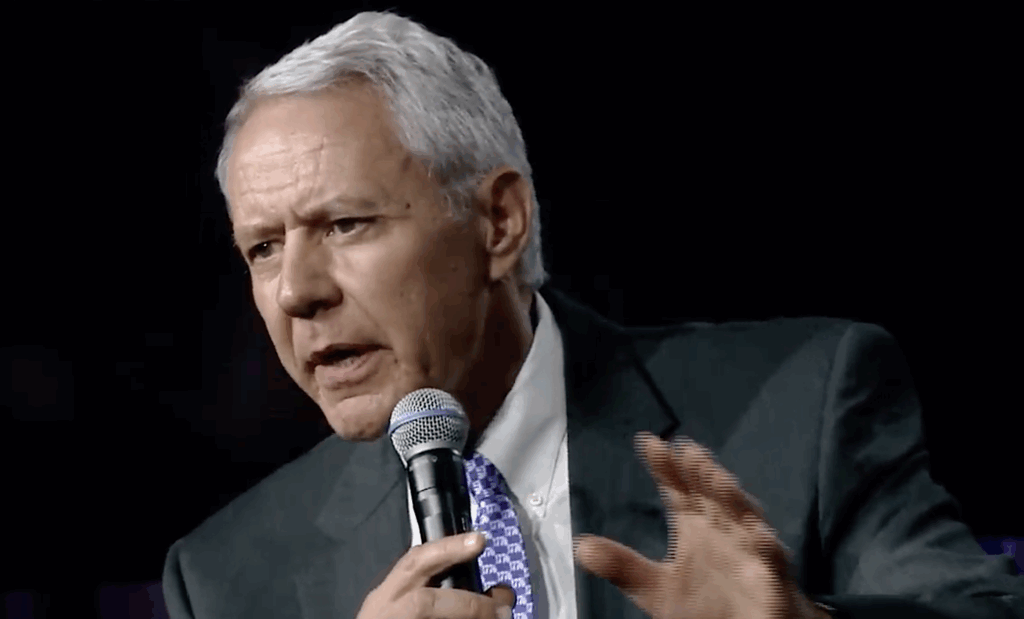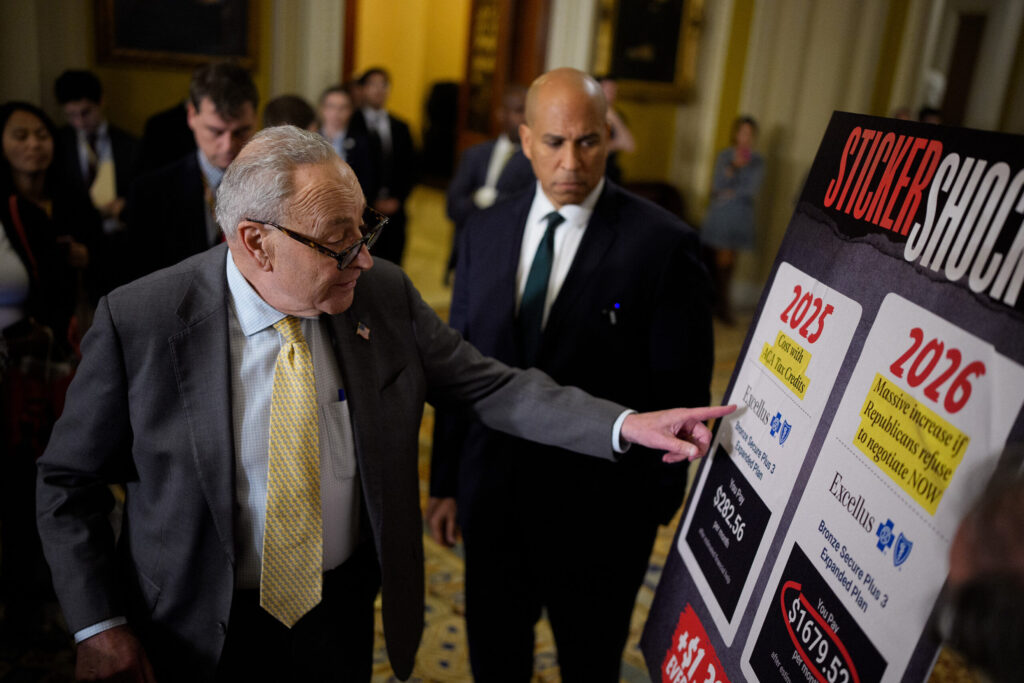New Colorado Springs Mayor Suthers has no regrets on passing up Senate race

John Suthers was sworn in Tuesday as mayor of Colorado Springs, a turn of events that still has some state politicos scratching their heads.
The former two-term attorney general had been on the short list of potential Republican challengers to Democratic Sen. Michael Bennet, a list that became even shorter Monday with Republican Rep. Mike Coffman’s decision not to seek the nomination.
Suthers is one of a small handful of Colorado Republicans who have been elected to statewide office more than once, a list that includes Coffman and state treasurer Walker Stapleton, as well as former Gov. Bill Owens and ex-Sen. Bill Armstrong, now retired from politics.
As the 63-year-old Suthers sees it, however, serving as mayor of Colorado Springs isn’t a step down. It’s more like the right move at the right time.
“It fit a lot better with my goals for the rest of my life,” Suthers said in an interview a few days before the swearing-in ceremony at the Pioneers Museum.
During his 14 years in Denver, Suthers maintained a downtown condo “so I didn’t have to do the drive every day,” but maintained his residence in Colorado Springs.
“My ambition in life is to be a good ancestor, and that entails contributions to your community but also making sure that you do the best you can for your loved ones and your immediate family,” Suthers said. “Having operated out of Denver for 14 years, as U.S. Attorney and Attorney General-— my wife and I had no desire to move out of Colorado Springs. Colorado Springs is our home.”
At Tuesday’s ceremony, Suthers struck an “ask not what your country can do for you” tone, calling on city employees to “rededicate yourselves to your public service commitment,” and residents to “recognize the great legacy we have inherited and to work together to build upon it as we continue the task of building a great city.”
“Ronald Reagan used to talk about the promise of the future by describing a shining city on a hill,” Suthers said. “Our task going forward is to continue the task of building a shining city at the foot of a great mountain.”
Suthers hit the ground running after easily defeating former Mayor Mary Lou Makepeace in the May 19 run-off election with 68 percent of the vote. Every day since then has been filled with meetings with city department heads and other local officials, learning the ropes of his new job.
As someone who has worn many hats during his long tenure in public service, however, Suthers has become something of an expert on transitions.
“Keep in mind that I transitioned into the DA’s office, the attorney general’s office, the U.S. Attorney’s office, and the Department of Corrections,” Suthers said. “My priority is to immerse myself in the operations of the city, and I’ve already started that process.”
His first order of business is to address the deteriorating infrastructure, epitomized by the potholes that dot city streets. Suthers favors placing a bond measure on the November ballot to pay for the improvements and repairs.
“I’ve got a June 12 meeting with the council, a half-day retreat, and one of the topics is going to be how do we address the infrastructure issues?” said Suthers. “I’m certainly going to encourage that [a bond measure], and what that mechanism looks like will have to be something that the council and I in conversations with the public come up with.”
Another challenge is to improve the climate at city hall, which has been marked in recent years by feuding between Mayor Steve Bach and the city council. One reason is that six of the nine council members are elected from districts and serve a particular constituency, while the mayor is elected citywide.
“One of the things the public was also not happy about was the lack of collaboration between the council and the mayor,” Suthers said. “I think we’ll spend a lot of time building that relationship and that’s part of why we’re meeting also.”
If Suthers is concerned about getting along with the council, he’s not showing it.
“I think that’s going to go very smoothly,” Suthers said. “Some of more problematic personalities on the council are gone and I’ve got a whole different management style than Mayor Bach, and I’m optimistic that’s going to happen.”
Then again, if anyone has experience in working with ideological foes, it’s Suthers, who was the attorney general for two Democratic governors — Bill Ritter and John Hickenlooper — as well as the Republican Owens. By all accounts, Suthers maintained smooth professional relationships with the governors, all three of whom attended his retirement send-off.
“First of all, let me say that they were all three very good human beings,” Suthers said. “I really enjoyed working with them all on a human level.”
In some ways, in fact, “it’s easier to have a governor of the opposite party,” he said.
“Because there’s not an expectation that you’re going to help their agenda. And so it’s a little easier to break news like, ‘Sorry, what you want to do doesn’t work out legally’ to someone on the other side than to someone in your own party who thinks you ought to be a little more of a party man,” Suthers said. “But having said that, the two years I worked for Gov. Owens went very well.”
If he had sought the Senate, he says, it would have been in 2010, when Bennet was running for the first time after being appointed to fill the vacancy created by Democratic Sen. Ken Salazar’s appointment to Interior Secretary.
Suthers also considered running for governor in 2006 after Owens left office. The problem with the timing of both races was that he was already serving as attorney general, a job he loved.
“I frankly came to the conclusion I just loved being attorney general so much I did not want to do that,” Suthers said. “If I was going to do it, those were the points I should have done it. At this point in my life, I really don’t have any desire to go to Washington to be one of 435, or one of 100 even.”
He adds with a grin, “Now, if the next Republican President of the United States offered me the job of U.S. Attorney General, I might reconsider. But that’s about it.”
One reason he enjoyed his old job so much, in fact, is that he tried not to view it as a stepping stone to higher office.
“For a good lawyer interested in public service, it’s a fantastic job,” he said. “I think too many of the state AGs are frankly burdened with their political ambitions because they want to be something else. They want to be governor, they want to be U.S. senator. I went into it wanting to be attorney general, and I think that made for a very good situation because I really tried first and foremost to be a good lawyer and not a good politician.”
Another thing he’s going to miss about the attorney general’s job is the anonymity. Despite being elected statewide, the attorney general is inevitably overshadowed by the governor, which was fine with Suthers.
His profile, at least locally, is sure to rise in his new post. Four years ago, Colorado Springs switched to a strong-mayor system in which the mayor works full time. The council, which continues to serve part-time, increased the mayor’s annual salary in March to $103,370.
Being attorney general is “about as much power as you can have without having a full-time body guard. Because people have no clue exactly what the attorney general does,” Suthers said. “I’m already finding out that more people know who the mayor is than who know who the attorney general is.”














